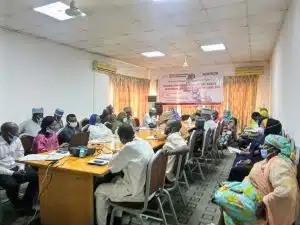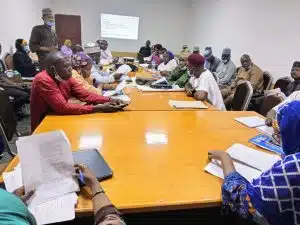Despite the effort of government and stakeholders to ameliorate Maternal and Child Mortality in Kano state, there isn’t any specific legislation that guides the behaviour of individuals at various health facilities vis-a-vis the care given to citizens.
The Maternal and Child Health mortality situation in Kano state has continued to rise, and statistics put Maternal mortality in the state at 576/100,000 and child mortality rate at 103/1000 live births.
Against this backdrop, the Resource Center for Human Rights and Civic Education (CHRICED) has come up with a draft bill on MNCH for Kano state, which seeks to critically look at prospects of addressing critical issues of MNCH in the State.
- Lack of accountability in constituency projects denies citizens access to quality services – CHRICED
- CHRICED writes KAROTA over proliferation of underage tricycle riders in Kano
- CHRICED to NPHCDA : ‘Probe the sale of Covid-19 vaccine cards’
“The issue of MNCH mortality in the state is at an alarming rate and no responsible Government or society will watch their future go through decimation concurrently.” Comr. Ibrahim Zikirullahi, the Executive director of CHRICED said.
He explained that healthcare shouldn’t be the privilege of a few wealthy individuals in the society, while the masses are left at the mercy of inadequate services.
He said “At the moment, the draft has been produced and critical stakeholders have been included, alongside professional bodies, low-income earners, community and traditional representatives amongst others to review it from different perspectives for finalization.
“Beyond this, we would engage the Kano state house of assembly to discuss the bill with them and the necessity for its approval. Afterwards we will present it to the house and then follow other processes.” Comr. Zikirullahi concluded.

When actualized, the implication of this bill is that donor partners will be confident that lives are impacted through the qualitative services those are the grassroots will receive. Thus, the process of accountability will be enhanced in the process of service delivery.
However, the morale of citizens would be boosted and will restore their confidence while visiting healthcare facilities owing to the fact that laws are guiding the process of healthcare service delivery in the state.
When signed into law, the bill will also generate additional resources for healthcare, thereby easing the government off certain financial burden. Accordingly, there will be a shared responsibility of MNCH by organizations in the state.
Dr A. B Ahmed a senior lecturer at the Faculty of Law, Bayero University Kano while explaining the importance of the bill to Kano’s MNCH situation said too many women, infants and children in Kano State still have little or no access to essential and qualitative health care services.
According to him, the bill when signed to law will end preventable deaths among all women and children thereby advancing the health and well-being of women, children and adolescents in the state.

Dr Maryam Mohammed, an Obstetrician Gynecologist at Muhammed Abdullahi Wase Specialist Teaching Hospital, Kano is optimistic about the bill, as individuals living in the rural communities would be provided with quality healthcare services when it becomes a reality.
“Although the MNCH mortality in Kano is high, it has recorded a decline over the years. That regardless, there is need for the figures to really go low. Thanks to this bill, we are hoping for a better system of healthcare service delivery in Kano state.” She said.
When it becomes a reality, the needles maternal and Child Mortality in Kano will decrease and will consequently fast-track qualitative service delivery in the state.


